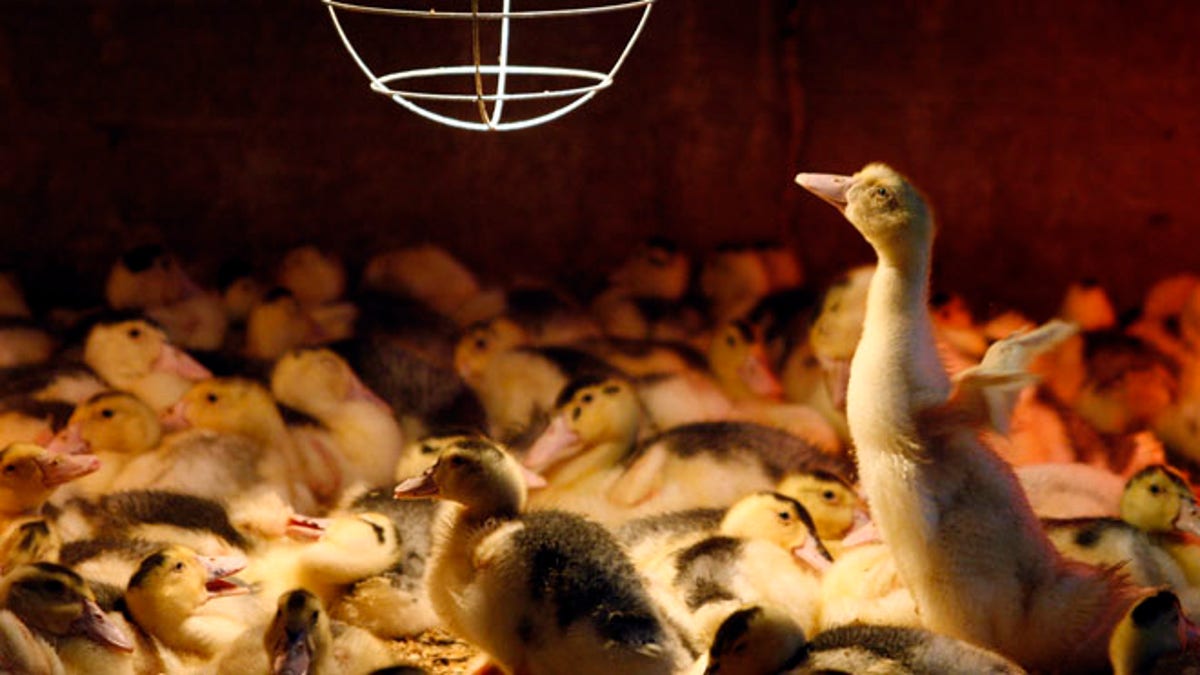
June 6, 2009: A three week old Mulard duck tries to fly inside a barn at the Ferme Basque in St-Urbain.
NEW YORK – California’s ban on force-feeding ducks and geese to produce foie gras could become an entrée on the U.S. Supreme Court’s summer menu.
According to a state law that was adopted in 2004 but didn’t take effect until two years ago, “a product may not be sold in California if it is the result of force-feeding a bird for the purpose of enlarging the bird’s liver beyond normal size,” the typical method of producing the rich and buttery delicacy.
But 13 states – including South Carolina, Missouri, Kansas and Georgia - say the ban unconstitutionally interferes with interstate commerce. They say California’s ban on the sale and production of foie gras restricts the delicacy’s legal production in states that never agreed to the ban and is hurting the businesses of out-of-state farmers.
The issue, attorneys for the 13 states agreed in a brief supporting the case, which was brought by Santa Monica, Calif.-based attorney Michael Tenenbaum, “is of exceptional importance to the preservation of state sovereignty.”
Tenenbaum represents some opponents of the law, including a California restaurant company, a New York foie gras producer and a Canadian organization of duck and goose farmers. The 13 states filed a separate brief making similar arguments.
California Deputy Attorney General Stephanie Zook, who led preparation of the state’s 14-page Supreme Court brief defending the ban, cited evidence that “force-feeding causes ducks’ livers to swell to 10 times their normal size.” Violations of the law are punishable by fines of up to $1,000 per sale per day, though its enforcement has not been strict.
On June 30, when most attention was focused on the final two rulings from the Supreme Court’s 2013-14 term, California Attorney General Kamala Harris told the justices that the foie gras case is not worth their time.
“State laws prohibiting the sale of products based on concerns about animal welfare, or simply on a social consensus concerning what is appropriate, are not unusual,” California’s brief says, adding that “several states prohibit the sale of horse meat for human consumption.”
But the constitutionality of the foie gras ban is what could trigger the Supreme Court’s attention. Opponents say the law violates the Constitution’s dormant commerce clause, a phrase that refers to a prohibition on states enacting discriminatory barriers against commerce from other states.
“California may forbid its own farmers from using an established feeding technique,” Tenenbaum wrote in his petition, “but California cannot then seek to ‘level the playing field’ by depriving out-of state farmers of the competitive advantage they retain.”
Zook countered that “California has not sought to protect or favor local producers or economic interests” with its foie gras ban.
Despite the ban and potential fines, California restaurants have been getting around the law for the past two years by serving foie gras to favorite customers for free, instead of selling it.
This past week at La Toque restaurant in Napa, an exclusive culinary event titled “The State of American Foie Gras” featured the forbidden delicacy. And to keep the event legal, La Toque hosted it free for 50 winners of a contest held on its Facebook page in which entrants submitted a post about “why California’s foie gras ban is foolish.”
By the 2014-2015 term's end next June, the Supreme Court will have heard about 75 cases. Roughly 35 more will be selected during private conferences, in which at least four justices must agree for a petition to be granted. Many of the decisions will be made at the court's so-called "long conference," set for Sept. 29.




